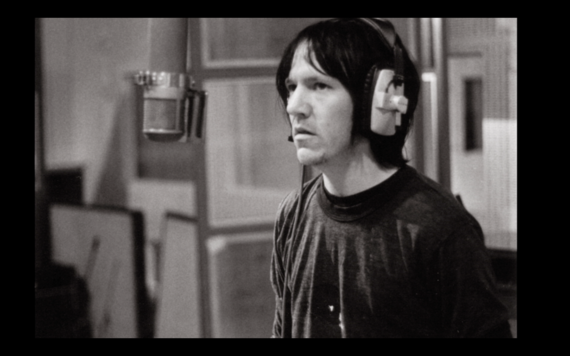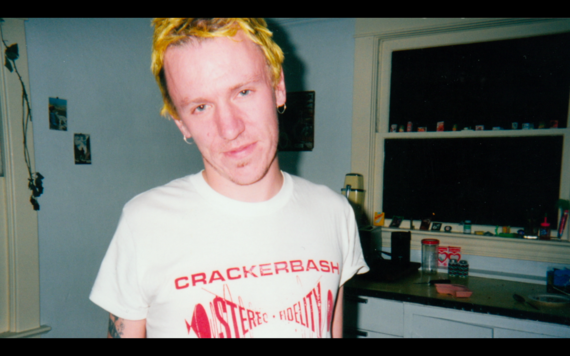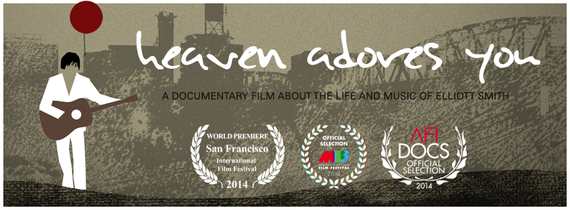A stunning new documentary, Heaven Adores You, about the life and music of Elliott Smith, has just started making the festival rounds. I had the pleasure of privately screening the film this past week in advance of upcoming public showings in Detroit and Portland, and I suggest you go see it the first opportunity you get.
The film is an intimate tribute to Elliott Smith's greatness and light, told by his closest friends and collaborators, and woven through original music and stories from his time in Portland, New York City and Los Angeles. Heaven Adores You is a beautiful experience, start-to-finish -- just as Elliott's life was.
Watch the Heaven Adores You trailer, then read a portion of our conversation below. The full transcript of our interview can be found at LoganLynnMusic.com
Logan Lynn: I just finished the film, which I watched through a mix of tears and laughter - very appropriate for the man it is about, I'd say. The music is such a big piece of the story, and you used it expertly. How did you decide which songs to use?
Kevin Moyer: It was such an honor to be able to use Elliott's own music, and of course it was also crucial for us because we have said all along we wanted the focus to be on his creative output rather than more sensational aspects of his life and death. But have to also show his life if you are intending to show Elliott progressing as an artist, so we did that again using the music as the anchor -- as the tent poles for the journey. We take you through his life by using the music he created and the albums he released as the kind of life chapters or sections of the film, starting with music he made as a young kid in Texas all the way up to the album he was working on when he died. We you where he was at when creating each one and we used those physical and tangible artistic achievements as the musical check points to tell the story. We wanted to use stuff that would be new and interesting to the existing fans who can be very hardcore and already knowledgeable of almost everything he ever did, balanced with stuff that was already familiar to the casual fan who only slightly knew his music, and also include stuff that was accessible and representative for the people who had never heard his music at all. And we wanted to also show his progression as a song writer.
Moyer: You can feel his sound forming and his evolution as an artist as you move through the film. I got to look into the vaults of both labels (Universal and KRS) and spent a good amount of time with friend and Elliott archivist Larry Crane, too. Basically, I dug through lots and lots of music and then narrowed it down to just the stuff that I thought would be interesting and most relevant for us to use -- probably about 150 tracks or so -- and then that's what I brought to the team; stuff from both labels, as well as stuff from friends, his high school days, his childhood in Texas, tapes from rehearsals, live performances, alternate versions of studio recordings, etc. I slowly began sending them to Nickolas (Rossi) who was huddled up in New York editing the footage together to tell the story. Every morning for about two weeks I would send him a batch of tracks -- usually stuff he had never heard before, two or three songs at a time -- because I wanted to give them each space to breathe so they could each be considered on their own accord. With each one, I'd tell him how I felt it might fit with different things we were discussing, what energy or vibe it might bring, what the lyrics might help to showcase, and so on. On his end, Nickolas compiled all of what I was sending him and then he did the same and put them through his own creative filter...
Lynn: As someone who knew Elliott, I remember feeling so angry about the way the media covered his death, and still sometimes get a bit of that "You didn't even know this man. Shut your fucking mouth." feeling when I hear people talk about him or his songs or his life. Was this kind of rampant public misrepresentation part of the motivation for making this film?
Moyer: Exactly. It was hard to hear the media cover it in such a callous way. His death hurt already and the way it was talked about by people who didn't know him made it hurt even more. There is a bit of a wall that gets put up by people and that's what happened here, I think most of us tried to safeguard ourselves from being a part of that by not discussing it at all, especially to the media, so most of the stuff that was done about Elliott ended up being done by people who didn't know him. But yeah, this project was definitely a reaction to that for me. I wanted to do something for Elliott by and with the people who knew him the best.
Lynn: I think that is what is so refreshing about the film, personally. Like... the truth is finally out there about this sweet, talented creature. There is a great line in the movie where a Quasi song is quoted "You don't hurt the ones you love, you hurt the ones who love you." and it's pretty clear that the experience of losing Elliott before he was actually gone is fairly universal amongst his collaborators and friends. That shared heartbreak is palpable amongst the interviewees, as with most people in his life who I know that are not in the film. I wish he could see Heaven Adores You and know how much we all loved him, how much he changed the world. Maybe he did know? I hope he did. How has the reaction been from his friends and the people in the film? It feels very respectful, almost like he was an advisor on the project... which, I'm guessing, in some ways, he was.
Moyer: Well, we tried to be as respectful as possible. To him and his legacy first and foremost, but also to all of the people around him who are still with us and who contributed, many of whom are still hurting. We wanted to be careful not to rub on any scars that might not yet be healed and we didn't want to make any new wounds, either. We had a lot of very heartfelt conversations with his friends and also amongst ourselves as a team about how to do certain things and how to do them in the most respectful way, while still being completely accurate and balanced. Was he with us? I don't know, but I do hope that he was. So many nice things were said that I wish that he was present to hear them. We did have lots of little odd things pop up during the process of production that felt a bit like maybe he was giving us the nod of approval, maybe letting us know he was cool with it...
Rossi: I got the feeling that there was a lot of heartbreak with Elliott even before he died. Falling outs, burned bridges, perhaps some bad choices, etc. Meeting with Elliott's friends required an immense amount of trust on their part for us to do the right thing. We've been lucky enough to have a few folks involved in the film watch it so far, and it's been well-received. It comes across as a great tribute to a guy that they miss dearly in their lives. We are screening in Portland in October and that will be a big gauge of how we did with the film, but sold-out audiences of fans across the globe so far are thanking us for making something that was honest and true and pure and respectful, so I think we accomplished what we had all set out to do at the beginning. I agree with Kevin -- there were a lot of moments throughout production that let us know that we were being well taken care of or looked after. By Elliott? Who knows? I like to think that he was allowing us to tell his story or create something for him to narrate his own story in some ways. It's the least we could do for the guy.
Lynn: It is a beautiful tribute. While I know he would have liked the truthful portrayal, while I was watching the film it struck me that Elliott might have been embarrassed about a movie being made about him. Did you take that into consideration as you were creating the documentary?
Moyer: Oh, I am sure that he would be embarrassed to be the focus of attention, and also too humble to admit that it is very much deserved. At the same time, he recorded and released music, and anyone who does that has the intention of wanting their art to be out there and to be heard. I think just because someone is an introvert, that doesn't necessarily mean that he didn't want his music to be heard. He did. He worked hard at it. He made music videos. There is a big difference between feeling uncomfortable in the spotlight or as center of attention, and not wanting your music to be heard and shared. He isn't around anymore to be able to tour and release more albums, so I guess that this is kind of another way of still trying to do that for him. But yeah, like Larry Crane mentions in the film, he would do the media and touring stuff so that he could do the writing and recording. The creative process and expression was his favorite thing, but I don't think that he was against his art being seen, either. I think that he wanted his art out there, and that he personally would have preferred to stay on the side and let it be the focus. So that's kind of what we tried to do, while also letting him speak for himself through old interviews and, of course, the music.
Rossi: Yeah, I bet he'd embarrassed or incredibly modest about the whole thing. I often thought about what it would be like if he was still alive and how it would be to make a film about him now. I imagine having to call Elliott on the phone and ask him things and can always hear this quiet, hesitant modest guy. It's very respectful of all of the folks who were honest and open enough to participate. They were really incredible to talk to, every one of them. It was a gift to be able to sit with the friends of Elliott Smith and hear them tell stories about him, and his evolution as a musician. And I think Elliott's music is what drives the story of his life -- and his music is incredible. There's no need to do anything other than make something out of total respect. And also, he would be totally embarrassed by the song we used in the credit roll at the end, but it just shows what a genius he really was.
Lynn: How has the public reception of even the idea of this film been so far?
Moyer: The interest in this film has been HUGE which is really great to see. It's a testament to how far-reaching Elliotts influence was; how relatable he is on such a global level. He writes about common themes and everyman scenarios that somehow just really connect all across the board. I wish he could see how big of a splash he made, We are getting interest from all over the world from fans, from distributors, from festivals -- Korea, Israel, Australia, everywhere in Europe, every corner of the US and Canada -- you name it. It's amazing. Our producer Marc Smolowitz has been feeling the pain of that intense interest, too. He is fielding all of the festival stuff and partnering with JT on the distribution requests. Marc joined the project when we were in post-production, although he was a behind the scenes support for Nickolas from the very early stages, and he has lifted this project up and carried us. The demand for Elliott is huge, even still, and its keeping us very busy! That's a really nice thing to realize, and it makes me happy.
Lynn: I love that you chose to make the focus of Heaven Adores You more about Elliott's music, his gift of humanity, rather than the tabloid stuff, which was really just a few years of his beautiful life. My experience of Elliott Smith was that he was very funny, very nice, not particularly ego-driven -- which is rare in this industry (and town, frankly) -- and the film really captured that kindness. Thank you for that. It was nice to see that on screen. What do you hope people who didn't know him will take away from watching the movie?
Rossi: I think what's remarkable about the story of Elliott Smith was how much of a normal guy he was -- who just happened to be a not-so-normal genius musician. John Chandler really sums it up at the end when he says that you should buy everything Elliott's ever recorded, because it's all good, and that everything he did was worth making room for in your life. I love that, and that's what I hope people leave the theater with. If you had no idea who Elliott Smith was, I hope that by the end of the film you think to yourself, "I should go and check out that guy's music a bit more."
Moyer: Yes. I guess I just have always felt that the last few moments of his life, and the few years leading up to it, shouldn't be the whole takeaway for his entire life as a whole. The sum of his life was certainly far more than just those final moments or last few years. People struggle every day. People die every day. We wanted to tell you why it was so much more than that; why we all loved him so much. What do I hope people take away, if they aren't already familiar with Elliott Smith or his music? My hope is that they become a fan and that they go and listen to his music and maybe buy all of his albums. If we can introduce others to his music, then that's something that is important, and something that he would want. I think he'd want his legacy to be about his art and music rather than his personal life, and if we can help his music reach a broader audience, then I think that's one way of keeping him alive and remembered too.
Read the full interview transcript HERE.
For more on Heaven Adores You and to find a screening near you, visit HeavenAdoresYou.com
For more on Logan Lynn, visit his website, or follow him on Facebook.



